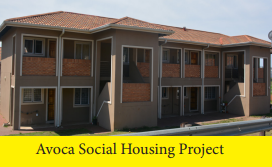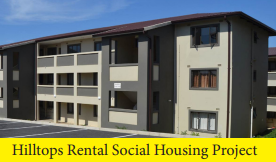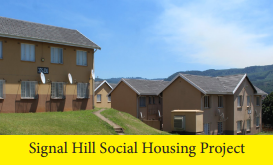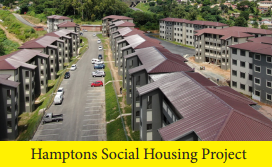Social Housing
WHAT IS SOCIAL HOUSING?
Social Housing means a rental housing option for low to medium income households and which is provided by Social Housing Institutions (SHI’s) or other delivery agents. SHI’s are institutions which are accredited under the Social Housing Act, 2008 (No. 16 of 2008) and provide rental or co-operative housing options for low to middle income households. Social Housing opportunities are shared between the income levels (30% for low-income families and 70% for middle income families), thus allowing improved access to rental options for the different income levels
The social housing programme seeks to contribute to the governments agenda of re-dressing the imbalances of the past by ensuring :
- Spatial transformation - (by bringing lower income and often disadvantaged people into areas where there are major economic opportunities, both with respect to jobs and consumption).
- Social transformation - (by promoting a mix of race and classes).
- Economic transformation - (by promoting spatial access to economic opportunity and promoting job creation via the multiplier effect associated with building medium density housing stock).
Social Housing is delivered in Restructuring Zones. A Restructuring Zone is a geographic area that has been identified for the purposes of Social Housing Social Housing Can also be implemented in Priority Human Settlement and Housing development areas (PHSHDAs).
WHAT ARE THE ADVANTAGES OF SOCIAL HOUSING?
Rental arrangements are known and discussed upfront. You can leave at any time, with no struggles of having to first sell. You can give notice whenever you want to move out, and do not have to first find someone to take over your rental payment. You can be as mobile as you want, and your monthly rent is cheaper than the bond repayment on a house. You do not have to pay property taxes, only monthly services fees (water and electricity). You share the responsibility for maintenance with the SHI.
WHAT IS THE KWAZULU-NATAL DEPARTMENT OF HUMAN SETTLEMENT’S ROLE IN THE SOCIAL HOUSING PROGRAMME?
The KwaZulu-Natal Department of Human Settlements:
- Ensures fairness, equity and compliance with national and provincial social housing norms and standards;
- Ensures the protection of consumers by creating awareness of consumers’ rights and obligations;
- Facilitates sustainability and growth in the social housing sector;
- Mediates in cases of conflict between the SHI or other delivery agent and a municipality, if required; / submits proposed restructuring zones to the Minister;
- Monitors Social Housing projects to ascertain that relevant prescripts, norms and standards are bring complied with;
- Ensures quality control on social housing projects that are undergoing construction; and
- Develops the capacity of municipalities to fulfil their roles and responsibilities in supporting social housing developments in these municipalities.
The Department does not interfere with the governance or management by SHI’s and the social housing developments.
HOW DOES ONE QUALIFY TO BE A SOCIAL HOUSING TENANT?
The Social Housing Subsidies are not given to tenants, but to the SHI that constructs and manages social housing (hence the name Institutional Subsidy).
Tenants have to meet the following requirements, set by the National Department of Human Settlements to qualify for social housing opportunities:
- You must be a South African citizen
- Gross household earning must be between R1850.00 and R22 000.00 per month.
- You must not own or have owned property before;
- You must not have received government subsidy before; and
- You must be 21 years of age or older, be married, cohabiting, or have dependents.
CAN A TENANT PURCHASE OR SUBLET A SOCIAL HOUSING UNIT?
All Social Housing projects in South Africa are purely rental housing projects. In this country, Social Housing Units are not for sale or ownership.
The subsidy from the Department is paid out in the name of the SHI and not in the name of the tenant (no ownership). All tenants sign a lease agreement and this is the only way to access social housing. Subletting of units is also not allowed.
WHY IS IT IMPORTANT TO PAY RENT IN SOCIAL HOUSING PROJECTS?
The Social Housing Programme involves 70% government funding. The balance is secured through a mortgage bond that is paid over of approximately 30 years.
The payment of rent is essential as the funds collected are utilized to service the mortgage bond with the National Housing Finance Corporation (NHFC).
The funds collected are also used to maintain the development to ensure its sustainability over a long period of time.
WHAT MUST A TENANT DO WHEN RENTAL PAYMENT CHALLENGES ARE EXPERIENCED?
As soon as a tenant experiences a problem with making the regular rental payment, he/she must contact the SHI and inform them. The matter will be discussed with the tenant in confidence, and every effort will be made to come to a satisfactory agreement
However, it is vitally important that a tenant does not allow the debt to escalate.
If the SHI is not informed about the tenant’s inability to make payment, they will follow the default policy and legal route to ensure that rent is paid.
If the SHI is not informed about the tenant’s inability to make payment, they will follow the default policy and legal route to ensure that rent is paid.
 |
 |
 |
 |


